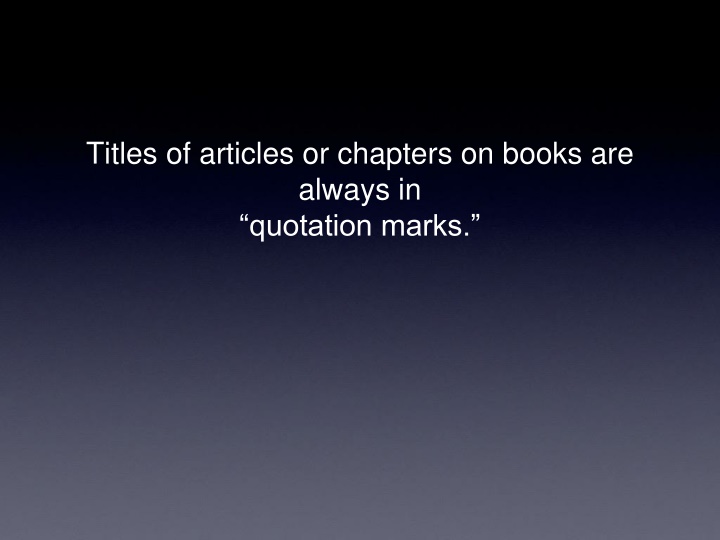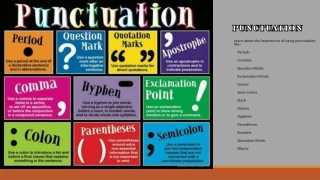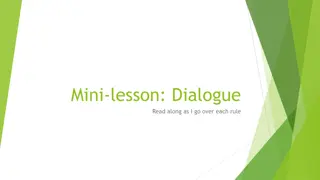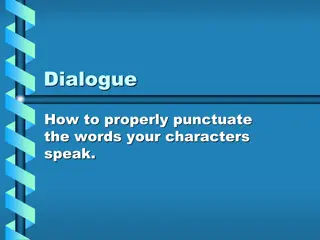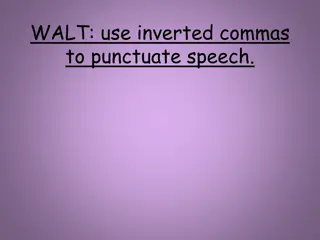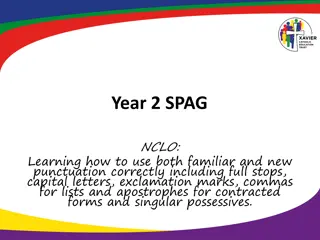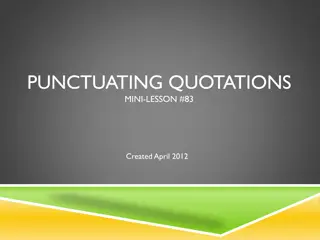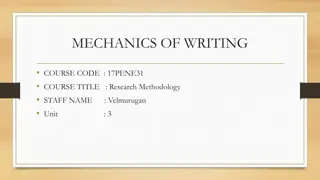Effective Writing Guidelines: Quotation Marks, Italics & Grammar Tips
Enhance your writing skills with essential guidelines for using quotation marks, italics, and maintaining grammatical consistency in your work. Discover key tips for citing quotations, avoiding malapropisms, and steering clear of passive voice constructions. Ensure your sentences have a clear subject and verb, following best practices for effective communication.
Download Presentation

Please find below an Image/Link to download the presentation.
The content on the website is provided AS IS for your information and personal use only. It may not be sold, licensed, or shared on other websites without obtaining consent from the author.If you encounter any issues during the download, it is possible that the publisher has removed the file from their server.
You are allowed to download the files provided on this website for personal or commercial use, subject to the condition that they are used lawfully. All files are the property of their respective owners.
The content on the website is provided AS IS for your information and personal use only. It may not be sold, licensed, or shared on other websites without obtaining consent from the author.
E N D
Presentation Transcript
Titles of articles or chapters on books are always in quotation marks.
Titles of books or works of art are always italicized.
Quotations within the text must fit grammatically as well as fit logically with your writing. Punctuation, verb tense, etc. must be consistent.
Quotations within the text must always cite a page number.
Within quotations, ellipses (. . .) are ONLY used if something from the middle of the quote has been removed. Do not begin and end quotations with . . .
BEWARE OF MALAPROPISMS noun: malapropism the mistaken use of a word in place of a similar-sounding one, often with unintentionally amusing effect, as in, for example, dance a flamingo (instead of flamenco ).
BEWARE OF PASSIVE VOICE Passive voice sentences mention the thing or person receiving an action before mentioning the action itself, and may omit the actor altogether.
http://www.grammarly.com/blog/2015/how-to- use-the-passive-voice-correctly-2/
Make sure each sentence has a clear subject and verb.
I am very serious about this. . . . . Make sure each sentence has a clear subject and verb.
Be concise. . . Using more words does not make you sound smarter.
Common editorial notations WC - questionable word choice/ connotation does not match intended meaning or too casual or too cliched WW - wrong word SP - spelling AWK - awkward/ sentence is wordy/ meaning unclear
Make this sentence better: Upon the street which there was a ball that being red had been kicked by a girl to such a superfluous velocity that a window upon the aforementioned street had been broken.
